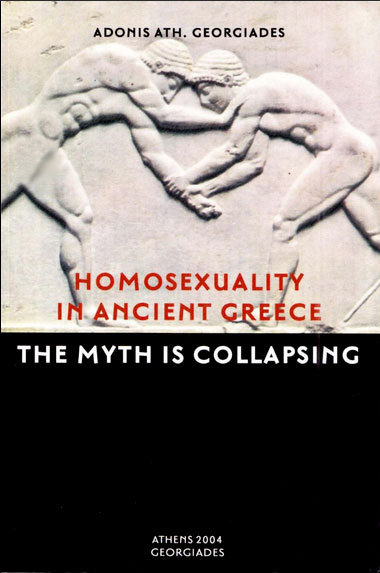A Summary of the Book “Homosexuality in Ancient Greece: The Myth is Collapsing”
by Edward Ulrich, updated May 10, 2021

“Homosexuality in Ancient Greece: The Myth is Collapsing,” by Adonis Georgiadis.
This article is a summary of a book entitled “Homosexuality in Ancient Greece: The Myth is Collapsing,” written by Adonis Georgiadis in 2004, where he details evidence showing that homosexuality was generally not considered acceptable, let alone “ideal” in ancient Greece. The evidence he examines includes the work of Athenian poets, vase illustrations, ancient laws at the time, and other types of information.
Download a PDF copy of the book.
[NOTE— May 10, 2021: The PDF file initially included example images of vases that contain extreme illustrations, so I have removed the images from the document.]
[NOTE: I have been seeing a lot of information that claims homosexual activity was mainstream and even “compulsory” in ancient Greece, such as being mentioned in documentaries and in this Wikipedia page, but I sensed that something didn’t seem accurate about that, and in fact it turns out that such accounts are usually very exaggerated or fabricated, as this article details.
As examples of the information in Georgiadis’ book, he explains that generally strict laws existed against homosexuality in Greece that sometimes even had the penalty of death, only a few vases exist that actually depict homosexual behavior, and certain words in Greek literature are frequently mis-translated to incorrectly imply sexual intent.
Of course homosexuality did exist in ancient Greece, but it was generally looked down upon by the society at the time, as Georgiadis’ book explains.
Note however that Georgiadis didn’t address the existence of the ridiculous “Sacred Band of Thebes,” which was supposedly a Spartan military troop of homosexuals. Apparently it is said to have been defeated in battle, which doesn’t surprise me. Personally I think military service and homosexuality are not compatible with each other, and in fact I wonder about the accuracy of the accounts of the troop’s existence in the first place.]
Jump to parts of this article ..
Chapter Summaries
Chapter 1: Social Context
Chapter 2: Sparta / Athens
Chapter 3: Athens’ Legislation About Homosexuality
Chapter 4: Lover-Loved One
Chapter 5: Vases
Chapter 6: Mythology
Chapter 7: The Comical Poets
Chapter 8: Female Homosexuality
Chapter 9: Alcebiades
Chapter 10: Alexander the Great
Conclusion
Chapter 1: Social Context
Chapter 2: Sparta / Athens
Chapter 3: Athens’ Legislation About Homosexuality
Chapter 4: Lover-Loved One
Chapter 5: Vases
Chapter 6: Mythology
Chapter 7: The Comical Poets
Chapter 8: Female Homosexuality
Chapter 9: Alcebiades
Chapter 10: Alexander the Great
Conclusion
Chapter Summaries
Chapter 1: Social Context
In this chapter, Georgiadis gives an overview of many sources making claims that homosexuality was widespread in ancient Greece, and he explains that he will primarily be debunking information that is presented in two books: “Homosexuality in Ancient Greece,” by Kenneth Dover, and “The Perverted,” by C. Siamakis.
Chapter 2: Sparta / Athens
This chapter explains that later Christian monks destroyed all but 3% of Greek texts while strategically leaving texts in existence that portrayed Greek society as being immersed in vice and corruption, however ancient Greek writings that speak against homosexuality still exist nonetheless. Claims of Plato being a homosexual are also debunked.
Chapter 3: Athens’ Legislation About Homosexuality
This chapter explains various laws that existed against homosexuality in ancient Greece, such as homosexuals being banned from public service, where the punishment sometimes even included the penalty of death.
Chapter 4: Lover-Loved One
This chapter explains that certain Greek words are often mistranslated to give them meanings of a sexual nature that was entirely not intended when they were spoken, which has resulted in modern people inaccurately assuming that Greek teachers were typically pedophiles.
Chapter 5: Vases
This chapter explains that some vases do exist that portray homosexuality, but the amount of such vases that exist are exaggerated, and many of them are actually depicting homosexuality in a negative light.
Chapter 6: Mythology
This chapter explains that stories of mythology usually do not mention homosexuality, and whenever they do mention it they only portray it in a negative light.
Chapter 7: The Comical Poets
This chapter explains that contrary to supporting or advocating for homosexuality, popular theater in ancient Greece usually only mocked or disparaged it.
Chapter 8: Female Homosexuality
This chapter explains that the world’s most famous lesbian Sappho likely did not even actually have such inclinations.
Chapter 9: Alcebiades
This chapter explains that the politician Alcebiades was notoriously hated in Athens due to his being a scapegoat for the downfall of the society, and as such writers falsely slandered him as being a bisexual after his death.
Chapter 10: Alexander the Great
This chapter explains how both Alexander the Great and his father have been inaccurately accused of being homosexuals.
Conclusion
In the conclusion, Georgiadis writes:
... [I]t was not part of this book’s aims to prove homosexuality unknown by ancient Greeks. It was known and, as it happens with all social phenomena, had various degrees of manifestation throughout the ages.
Nor was this book written to declare some sort of a war to homosexuals, since, from my point of view, everyone has the right to make their own sexual choices, if he does no harm to others. I only wish they didn’t try to impose them as an example to be imitated, as I get the feeling that certain media do, thus creating confusion as to what is normal and not.
...
I am sure that this essay doesn’t include all the revenant evidence, yet I consider those included as more than enough.
Chapter 1: Social Context
In this chapter, Georgiadis gives an overview of many sources making claims that homosexuality was widespread in ancient Greece, and he explains that he will primarily be debunking information that is presented in two books: “Homosexuality in Ancient Greece,” by Kenneth Dover, and “The Perverted,” by C. Siamakis.
Chapter 2: Sparta / Athens
This chapter explains that later Christian monks destroyed all but 3% of Greek texts while strategically leaving texts in existence that portrayed Greek society as being immersed in vice and corruption, however ancient Greek writings that speak against homosexuality still exist nonetheless. Claims of Plato being a homosexual are also debunked.
Chapter 3: Athens’ Legislation About Homosexuality
This chapter explains various laws that existed against homosexuality in ancient Greece, such as homosexuals being banned from public service, where the punishment sometimes even included the penalty of death.
Chapter 4: Lover-Loved One
This chapter explains that certain Greek words are often mistranslated to give them meanings of a sexual nature that was entirely not intended when they were spoken, which has resulted in modern people inaccurately assuming that Greek teachers were typically pedophiles.
Chapter 5: Vases
This chapter explains that some vases do exist that portray homosexuality, but the amount of such vases that exist are exaggerated, and many of them are actually depicting homosexuality in a negative light.
Chapter 6: Mythology
This chapter explains that stories of mythology usually do not mention homosexuality, and whenever they do mention it they only portray it in a negative light.
Chapter 7: The Comical Poets
This chapter explains that contrary to supporting or advocating for homosexuality, popular theater in ancient Greece usually only mocked or disparaged it.
Chapter 8: Female Homosexuality
This chapter explains that the world’s most famous lesbian Sappho likely did not even actually have such inclinations.
Chapter 9: Alcebiades
This chapter explains that the politician Alcebiades was notoriously hated in Athens due to his being a scapegoat for the downfall of the society, and as such writers falsely slandered him as being a bisexual after his death.
Chapter 10: Alexander the Great
This chapter explains how both Alexander the Great and his father have been inaccurately accused of being homosexuals.
Conclusion
In the conclusion, Georgiadis writes:
... [I]t was not part of this book’s aims to prove homosexuality unknown by ancient Greeks. It was known and, as it happens with all social phenomena, had various degrees of manifestation throughout the ages.
Nor was this book written to declare some sort of a war to homosexuals, since, from my point of view, everyone has the right to make their own sexual choices, if he does no harm to others. I only wish they didn’t try to impose them as an example to be imitated, as I get the feeling that certain media do, thus creating confusion as to what is normal and not.
...
I am sure that this essay doesn’t include all the revenant evidence, yet I consider those included as more than enough.
Chapter 1: Social Context
In this chapter, Georgiadis gives an overview of many sources making claims that homosexuality was widespread in ancient Greece, and he explains that he will primarily be debunking information that is presented in two books: “Homosexuality in Ancient Greece,” by Kenneth Dover, and “The Perverted,” by C. Siamakis.
— Georgiadis explains that sources ranging from cheap weekly reviews and newspapers to so-called “reliable” and “scientific” books attempt to claim that homosexuality was universally accepted in Greece, however his research has found the allegation to be a hoax.
— Researchers who promote the idea of widespread and totally accepted homosexuality in Greece usually never present any opposing points of view, and the arguments put forward by some of the most serious scientists are not good enough to justify the conclusions that they reach, as Georgiadis will explain in this book.
— Georgiadis explains that in particular he will detail and debunk information in Kenneth Dover’s book “Homosexuality in Ancient Greece,” and C. Siamakis’ book “The Perverted.”
Chapter 2: Sparta / Athens
This chapter explains that later Christian monks destroyed all but 3% of Greek texts while strategically leaving texts in existence that portrayed Greek society as being immersed in vice and corruption, however ancient Greek writings that speak against homosexuality still exist nonetheless. Claims of Plato being a homosexual are also debunked.
— Georgiadis details some quotes from Spartan writings that speak against homosexual activity, and also a quote is shown that shows how Spartan women actually valued their husbands in a manner that is contrary to common claims that they did not.
— Georgiadis claims that it is very likely that much Greek literature that spoke against homosexuality was destroyed by later Christian monks who destroyed all but 3% of Greek writings— while at the same time they likely left pro-homosexuality writings in existence out of a strategy of tarnishing the reputation of the ancient Greek world, due to having a strategy of portraying the previous society as sunk in vice and corruption. He then adds: “In any case, though, what is left if undoubtedly more than enough [to prove the case that the Greeks spoke against homosexuality.]”
About false claims of Plato being a pedophile and homosexual
— Georgiadis details various quotes from a book called “The Perverted” by C. Siamakis that claims many influential Greeks such as Plato are paderasts (pedophiles). He says: “Let me say again I find this book to be extremely insulting to my ancestors and, if it hadn’t been published by a teacher, I wouldn’t have bothered mentioning it. ...” [Note: The book was published in 1991, and I have not been able to find it online, perhaps it was retracted. Nonetheless those types of claims are commonly made elsewhere as well, such as in this Wikipedia article that claims Plato was a homosexual in the first sentence!]
— Georgiadis explains that Plato actually said the following: (Plato, Leges 636c:) “It is understood that, since their birth, nature urges females and males to have sexual intercourse with one another, and it is obvious that sexual pleasure is given to them according to nature, while against nature between two males or two females.”
— Georgiadis then details other writings by Plato that depict homosexuality as being an unnatural act in nature, where he reasons that humans should behave the same way, saying citizens “must prove themselves even better than beasts.”
— Plato also said (Plato, Leges 841:d) “No one should dare have sex with the brave and free but their own wives, nor should he be allowed to have illegitimate offspring by concubines or childless and unnatural intercourse with men; even better, sexual intercourse between men should be once and for all prohibited.”
— Georgiadis then points out that the author Siamakis has also made strangely inaccurate claims about the origin of the alphabet in another book that he wrote. He closes the chapter by saying: “Mr. Siamakis uses the same tactics in treating other subjects as in the case of the homosexuality in ancient Greece question. According to me, he has recourse to misquotation, twisting, distortion. If I only knew why.”
Chapter 3: Athens’ Legislation About Homosexuality
This chapter explains various laws that existed against homosexuality in ancient Greece, such as homosexuals being banned from public service, where the punishment sometimes even included the penalty of death.
— Georgiadis explains that examples of Greek legislation pertaining to the issue of homosexuality exist, which was communicated by an orator named Aeschines in the middle of the 4th century BC.
— Contrary to what people currently attempt to claim, Athens had adopted rigorous legislation opposed to homosexuality and pederasty, with severe punishments including death.
— “Aeschines, Against Timarchus 12” mandates the penalty of death for unauthorized adults who enter a school.
— “Aeschines, Against Timarchus 16” mandates that if someone “insults” (is “lustful”) to a free boy, then he should be tried and either be executed or made to pay a fine, and if he cannot pay the fine he will be imprisoned until he can pay it.
— “Demosthenes, Against Meidias, 47” says if someone is found guilty of “insulting” (being lustful) to a child, woman or man, free or slave, then they must be sentenced to pay a fine or be executed.
— “Aeschines, Against Timarchus 21” says: “If Athenian turns out to be ‘unchaste’ [meaning involved in a homosexual relationship], then he is not allowed to become one of the nine archons; or to become a priest; or to be prosecutor in a public trial; or to have any office, within the boundaries of the Athenian republic or beyond them, wether he is appointed by lot or after an election; or to serve as a public messenger or judge other public messengers; or to enter public sacred places, to participate in [religious ceremonies of] wearing to wreath, to be in the parts of the market-place sprinkled with lustral water. But, if he breaks the law and does any of the above, once he is found guilty of being unchaste, his sentence must be death.”
— In Athens, citizens could accuse lewd people of being “unchaste” in front of a judge and ask for their expulsion from the group of citizens or even for their conviction to death. Some modern apologists attempt to claim that the laws only applied to “male prostitution,” however the translation of the “unchaste” word has a wider scope than that.
— Prostitutes were condemned more in Greece than men who had sex with other men, but homosexual were condemned nonetheless, as is demonstrated by various testimonies that were conveyed by Georgiadis.
— “Aeschines, Against Timarchus, 13” says: “If a child’s father, or brother, or uncle, or tutor, or relative of any kind, receives money to give the child for unchaste purposes, the child is not prosecuted, but the one of paid and the one who received the money are.”
— Sexual relations with slaves was outlawed as well.
— Consenting adult homosexuals were stripped of their rights as Athenian citizens, where they could not be a part of the political, social, or religious life of the city. Homosexuals were barred from serving public office under the penalty of death.
— The writer H.I. Marrow wrote in his work “History of Education in Antiquity”: “[Apologists attempt] to depict ancient Greece as the paradise of the perverted, which was an exaggeration. Greek vocabulary and most cities’ legislation confirm that perversion never stopped being treated as unnatural.”
Chapter 4: Lover-Loved One
This chapter explains that certain Greek words are often mistranslated to give them meanings of a sexual nature that was entirely not intended when they were spoken, which has resulted in modern people inaccurately assuming that Greek teachers were typically pedophiles.
— People often claim that homosexuality was accepted and even almost “compulsory” in ancient Greece because the words “lover - loved one” and “pederasty” are often found in texts, and vases from that time period exist that depict pederast homosexual scenes, however there are issues with such evidence, as will be explained throughout the rest of this book.
— Many people have been led to assume that Homer described Achilles and Patroclus as being a notorious homosexual couple, and Achilles is supposedly “the first known homosexual hero,” but those perceptions are not based on actual facts but rather simply rumors on the internet. In his book “Love in Ancient Greece,” the author Robert Flaceriere did acknowldege the fact that Homer wasn’t a homosexal, however he also made a common blanket accusation that later Greek poets were pederasts.
— Georgiadis presents a variety of quotes that people often cite to support an assumption that Plato supported pederasty, and he explains that the quotes are actually mistranslations, where a word that is frequently interpreted as “lover” should actually only mean “teacher / advisor / mentor” without any sexual overtones. To prove his point, he presented quotes by Plato that show the mistranslation being entirely in contrast with what Plato was trying to say. Additional evidence about that issue is also explained in subsequent chapters.
Chapter 5: Vases
This chapter explains that some vases do exist that portray homosexuality, but the amount of such vases that exist are exaggerated, and many of them are actually depicting homosexuality in a negative light.
— People who intent to portrait ancient Greece as a place where homosexuality and pederasty were tolerated and approved of often cite illustrations on vases that were made at the time to make their point.
— Large amounts of vases were made in ancient Greece, and they depicted scenes of every aspect of life.
— Kenneth Dover is a scholar who wrote a book in 1978 called “Greek Homosexuality” where he claimed that as many as 600 vases exist that contain homosexual scenes. However, Georgiadis explains that only about 30 of the vases in question actually contain geunine scenes of homosexuality, with the rest portraying either heterosexual scenes or simply images of heroes, battles, or mythological themes.
[Note: I think many of the illustrations in question are vulgar nonetheless since they usually show male genitalia, as is often the case with a lot of artwork from antiquity. I think it is almost a certainty that those artists were homosexuals even if they weren’t actually depicting specific homosexual activity. For example, an illustration on a vase shows a warrior being bandaged while you can see his “junk” up his kilt.
I think it is very strange that a trend of depicting male genitalia had become relatively common in the artwork from antiquity, and I’m surprised that so much of it has survived without being vandalized depite its controversial nature.
Actually, apparently many nude male figures on Michelangelo’s frescos in the Sistine Chapel were later retouched to be covered with clothing at the instruction of Popes in the 1500’s, which I think was appropriate to do.]
— Georgiadis explains passages from Dover’s book where he shows that Dover goes to great lengths to attempt to portray homoerotic intent in all sorts of innocuous scenes. Georgiadis says: “What can really be said about these commentaries? Fantasies they are, not only of the ancient artist who simply paints warriors holding javelins; they belong to those who are not afraid of becoming picturesque, as long as they can hence sustain that homosexuality and pedantry were tolerated and widely approved of in ancient Greece.”
— Actual specific homosexual intercourse is depicted only on vases in the case of non-human “satyrs,” and satyrs were an example of what to avoid rather than imitate. However, some vases do exist that show homosexual contact between human males nonetheless, albeit not “intercourse,” suggesting that it was likely that a law existed against depicting actual homosexual intercourse on vases.
— Only a few vases exist from Greek antiquity that genuinely depict homosexuality. Georgiadis says, “... Nothing excludes their making by a homosexual artist or for a homosexual client, probably living far from Attica, or even a barbarian; attic vases were exported to where they were commanded, that is, around the world.” [Note: I think such vases must have always been a sought-after novelty among specific segments of the population due to their unique nature, and thus it must have contributed to them surviving the ages until now at a higher rate than vases depicting more typical scenes.]
— Georgiadis compares the situation with a hypothetical one of a future historian concluding that Greeks are homosexuals due to one out of four characters in a random television show being that way, or due to the chance discovery of a homosexual magazine that has happened to survive.
— Georgiadis says, “... It must be noted that pottery was at that time a real form of art and, as such, it didn’t mean to show everyday life, but to provoke and even to shake common beliefs.”
— Georgiadis concludes the chapter by saying: “Vases convince no one but those who want to be convinced by passing superficial impressions. On the contrary, they reveal a most conservative, compared to our standards, society, where certain things, even when they are done— and they were surely done, at that time as at all—, must never come to the light.”
Chapter 6: Mythology
This chapter explains that stories of mythology usually do not mention homosexuality, and whenever they do mention it they only portray it in a negative light.
— The writings of Homer were similar to the “Bible” to the ancient Greeks, where his epic stories can be thought of as being the model for every attitude and value that they had. However, none of his writings contain references to relationships between people of the same sex.
— Greek mythology in general has many heterosexual love stories, but not any homosexual ones. Some people attempt to claim that Hercules was a homosexual, but that claim is not true and in fact many of the stories about him revolve around his relationships with women.
The myth of Perlops and Hippodamia
— A story involving homosexuality does exist in mythology, being a part of a myth involving characters named Perlops and Hippodamia, where a male character named Laius kidnapped and raped the son of Perlops, which resulted in Perlops cursing him and causing numerous misfortunes for subsequent generations of the Lavdacus family. To Greek minds at the time, the rape by Laius was such an odious deed that he deserved to be killed by his own son Oedipus, and coming generations of his family were also punished for it, where the curse continued even to Oedipus who unknowingly married his own mother and had children with her, resulting in her killing herself and his taking out his own eyes when they discovered the truth. The curse then continued, with Oedipus’ siblings Etocles and Polynices engaging in a bloody civil war where both of them died, with the last victim of the curse being Oedipus’ daughter Antigone, where her sister Ismene was then freed by her sacrifice.
— ... Georgiadis explains that the story is indicative of the treatment of the topic of homosexuality by Greek mythology, which is a reflection of the society’s general attitude being very opposed to homosexual acts.
About claims of Zeus being a homosexual
— Zeus is known as the father as all gods and men, and he had love affairs with numerous goddesses and human women. However, a single myth called “The Abduction of Ganymede” was enough for some to proclaim him as being “an eternal protector of homosexuals.” Kenneth Dover even selected a vase with that scene as the cover for his book in order to try to equate the Greek father of Gods and humans with homosexuality. In the myth, Zeus sees a “beautiful” man and abducts him to Olympus to make him his cup bearer because he didn’t want him to be lost in the world of the mortals.
— ... However, even Socrates conveyed his interpretation of the Ganymede myth at the time, where he also cleared up the question of friendship between Achilles and Patroclus (in Xenophon, Symposium VIII, 28-32). He explained that Zeus abducted Ganymede only for the “beauty” of his soul and intellect, where his very name even means “one takes pleasure in listening to him” and he was called “one who has wise thoughts,” where Ganymede was honored among the Gods not for his physical appearance but only because of his wisdom.
About other mythological figures
— Socrates continued in his quote by relating the fact that the semi-gods Orestes and Pylades, and Theseus and Peirithous, are praised because their friendships allowed them to accomplish great deeds, and even he pointed out that just because they had friendships it doesn’t make them homosexuals.
— Georgiadis says: “Greek thought, as reflected in the mythology, reveals a world where socially approved sex tends to be confined in the heterosexual model.”
— Eros as a divinity is a somewhat complex case. He was an attendant to Aphrodite, and he is described as the primary cause of everything that exists. “Eros” is the strong desire for something, which is the power that brings order to chaos. Eros had a “trickster” double nature that could fluster everyone from Zeus to Apollo to the simplest human, but he was also the creative principal of all that exists. In Greek mythology the Cosmos was born due to the harmony between the opposing forces of “love” and “feud,” where Eros the God is the symbol of the purest creative universal power. People made sacrifices to Eros, but their doing so is falsely misinterpreted as honoring the “physical” rather than the substantive beauty of human creations.
— ... Georgiadis closes the chapter by saying, “... Besides, Academia, Plato’s school, was the perfect location to place the statue of this Eros, since Plato had described this form of love. He couldn’t have imagined how distorted his words would be after several thousands of years.”
Chapter 7: The Comical Poets
This chapter explains that contrary to supporting or advocating for homosexuality, popular theater in ancient Greece usually only mocked or disparaged it.
— The description of homosexuals in the poetry of classical Greece is indicative of attitudes about it at the time. The “tragic poets” were conservative as the rest of the general society was, and therefore they didn’t really speak about that matter, however the “comical poets” that expressed views of popular culture at the time did speak openly about the issue— however, they almost always mocked homosexuality rather than advocating for it.
— The comics often used the term “wide-breeched” as a pejorative to refer to homosexuals, such as the poet Agathon did. Agathon also referred to homosexuality as a word that means “given to unnatural lust” in the same family of “buttocks,” as well as using other pejorative words.
— Georgiadis notes that despite the fact that a poet Agathon was outspoken against homosexuality, he never mentioned the word that is today incorrectly translated as “lover-loved one” (as previously explained), thus being additional evidence that the word is mistranslated.
— When Aristophanes wanted to make a distinction between a moral and immoral young man in a play, he used a word that means “unnatural lust,” and in the same play the main character Strepsiades swears his son for being “loose-breeched” and “parricidal” (meaning to kill one’s parents), where both terms were intended to be equally condemning to the spectator’s ears.
— A comical poet wrote a play to satirize the “dissenters” of his time, using a word meaning “people who have never served in the army,” as well as a word meaning “effeminated.” In other words, he was putting homosexuals in the same category of people who didn’t serve their city, which was highly disapproved of.
— Aristophanes never tired of humiliating homosexuality at every chance. For example, in a play a character Trygaeus brought a beetle to his house and he fed it with excrement to use it as a transport to the summit of Mount Olympus, and the slave who was responsible for the beetle asked someone to bring him an “excrement-pie” from an “unchaste man,” alluding that his being “wide-breeched” would make the best pies of that kind.
— Georgiadis notes that if a modern writer were to use such depreciating terms for homosexuality it would cause a an outcry, especially among the intellectuals.
— Heterosexuality is depicted as being widely valued in the plays, however. For example in a play the women decided to stop having sex with their husbands in order to force them to stop a war with Sparta, and the men gave way quickly because they could not stand the abstinence.
— Homosexual apologists acknowledge that the “popular” attitude at the time was against homosexuality, but they claim that the “upper class” preferred pederasty. However the evidence shows that view to not be accurate since theatre was a major interest of all Athenians, and the richest and most illustrious families assumed the enormous expenses of the productions; therefore, it does not seem conceivable that prolific comical poets such as Aristophanes would have gotten away with systematically insulting their patrons in such a manner if in fact those patrons didn’t appreciate what they were saying.
— Homosexual apologists also say that there was a perception at the time that the wives of wealthy citizens more often stayed at home, which was supposedly a source of jokes that wealthy men engaged in homosexual relationships due to a “lack of women” when away from home. However, in ancient Athens, rich men had opportunities to have sex with women when away from home if they wanted to, since dozens of brothels existed in the city, and even more brothels existed in Piraeus, which was the biggest port at that time. Also wealthy men sometimes had permanent relationships with highly-paid “courtesans,” and female slaves could be purchased to be a concubines as well.
— Georgiadis closes the chapter by saying: “... I can only repeat that homosexuals are presented in the most depreciative way in ancient comedies; this means that these plays offer us one of our strongest arguments in our effort to prove that homosexuality was not the widely tolerated, if not imperative, ‘Greek way.’”
Chapter 8: Female Homosexuality
This chapter explains that the world’s most famous lesbian Sappho likely did not even actually have such inclinations.
— Georgiadis explains that he did not initially detail issues with female homosexuality in ancient Greece when he first presented his findings at the National Metsovion Polytechnic School of Athens, since he considered it to be of relatively minor importance when compared with the disproportionate amount of inaccurate perceptions that people have about male homosexuality in Greece.
— In almost every language, the word “lesbian” is used when referring to female homosexuality, which refers to the poetess Sappho who lived on the Greek island of Lesvos. Sappho was known simply as “The Poetess” by ancient Greeks without further specification, as Homer was known as “The Poet.” She lived in the 7th century BC, and she wrote seven books, but only a few fragmentary verses have survived. She is widely thought of as being a homosexual, however there is no real evidence that she was actually that way.
— Georgiadis quotes from page 173 in K.T. Dover’s book Greek Homosexuality: “The evidence for her homosexuality is fragmentary in the literal sense: only one of her poems survives complete (quoted by a literary critic of the Roman period), the rest being represented by scraps of ancient copies, in which a complete line is a rarity, and by later writers’ quotations of short passages, individual lines or phrases. The evidence is also fragile and ambiguous (...). Comment on Sappho’s erotic relationships with women does not begin, so far as the extant evidence goes, until Hellenistic times.”
— Robert Flaceriere wrote in page 98 of his book Love in Ancient Greece: “... Yet this is the moment to deal with a preliminary question: is it fair to include Sappho in a chapter dealing with homosexual love? The accusations for ‘sapphism’ and ‘lesbianism’, made against the poetess in the Antiquity, are, according to numerous Hellenists and historians, pure slander.”
— ... To which Georgiadis says: “What is the meaning of all this? Even the scholars who tend to consider homosexuality as a major social phenomenon in ancient Greece, hesitate in calling Sappho a homosexual, although the rest of the people do so, without even caring to prove it. This is a typical example of something being considered to be true, only because there is a general feeling about it.”
— Georgiadis explains that most people have misconceptions about many Greek myths, not only the ones that are associated with homosexuality.
— Sappho was thought of as a very admirable poet by the ancient Greeks, however many later Christian writers have depicted her as as being a “sex-maniac prostitute who makes poetry out of her own lewdness.”
— Dr. Vassilis Lazanas, from the University of Tubigen in Germany, wrote in his book “Ancient Greek Epigram Poets of Aegean” on page 170: “... during theses last decades the question has been seriously and insistently examined by distinguished scholars, such as F.C. Welcomer and others. Their studies conclude as follows: girls taking part to Sappho’s circle came from different parts of Lesvos and even from outside the island. ... It is most probable that the girls were gathering there to concentrate on learning music and dance, on reading and reciting poetry, on teaching good manners, and so on. Let us not forget that, in Lesvos, social structure and morals were completely different from the rest of Greece. Women were emancipated, at least to a certain point. ... It is, after all, almost certain that the poetry Sappho wrote, describing and inspired by the relation she had with her disciples as well as the relation they had with each other, would be misinterpreted. ... But there is not a single word in her poems to be read as a hint of lesbian love.”
— The works of Sappho were lost due to being thrown into a fire along with the works of Alcaeus in the 11th century AD, due to their writing being too “daring” for the barbarian tastes of the Middle Ages.
— Sappho was exceptionally praised by several ancient writers, and she was later accused of being a homosexual centuries after her death during the Hellenistic (pre-Roman) years. The ancient writer Lucianus wrote a work telling people not to trust the slander that claim her as “having indecent friendships,” and the ancient writer Hesychinus from Alexandria said: “to the women of Lesvos were addressed unfounded accusations.”
— Sappho was a “superstar” to the ancient Greeks, and the false accusations of homosexuality were apparently leveled at her by conservative Greeks who resented the fact that she was a talented and independent woman. Sappho was also exhibiting the type of “mentoring” relationship with her female students that was only allowed between male teachers with their males students at the time, which was thought of as “high treason” to the ancient Greeks.
— Sappho actually even committed suicide by throwing herself off a cliff in the island of Lefkada in the Ionian Sea, because she was broken hearted about being left by her boyfriend Faon from Mytilene! Georgiadis says: “... Yes, the world’s ‘most famous lesbian’ killed herself out of love frustration.”
— The story of Sappho committing suicide was much known among the ancient writers, for example Athenaeus said that Sappho’s love for Faon was “famous.”
— Many modern scholars such as Yves Battistini either deliberately or out of carelessness perpetuate cliches about Sappho by misinterpreting texts, such as mistranslating a quote to read: “Someone else is the object of her desire: a girl.”
— Georgiadis closes the chapter by saying, “I have just proved, beyond any doubt, as I believe, that the idea we have about Sappho is far from being accurate. But, strong financial interests, do not want anymore this image to change, no matter how false and unreal it is for Sappho. Lesbian unions from all over the world, as I learn constantly promote Eressos of Lesvos, as their birthplace and urge their sympathizers to visit it on their vacation. The truth, however, has to be spoken, regardless of the interests at stake.”
Chapter 9: Alcebiades
This chapter explains that the politician Alcebiades was notoriously hated in Athens due to his being a scapegoat for the downfall of the society, and as such writers falsely slandered him as being a bisexual after his death.
— Alcebiades was a politician in the 5th century BC that caused many problems for the people of Athens, and as such he was generally a hated figure.
— Alcebiades was depicted as being a bisexual by various writers such as Plutarch, Diodorus, and Plato, and with the exception of Plato all of the writers presented him in a negative light as being an extremely immoral “worst specimen of man.” Therefore whatever characteristics were attributed to Alcebiades were meant as an example of what to avoid rather than imitate.
— Alcebiades was the descendant of a wealthy Athenian family, and he was an ambitious and successful politician, eventually becoming chief of the Democratic Party. He was charismatic and he had many friends, followers, and enemies.
— Alcebiades gave himself the title of “General Emperor” and he engaged in a reckless campaign of a war against Sicily.
— Political opponents of Alcebiades accused his followers of an event of vandalism of revered statues of Hermae throughout Athens when his expedition to Sicily was beginning, and thus he was summoned back to court to be tried for the crime. Alcebiades knew that he would likely be killed if he went back because his political friends were away and could not defend him, so he escaped and took refuge in the rival city Sparta, where he managed to reverse the course of the Peloponnesian war.
— Up until that point, Athens and its allies were prevailing. However, after a major defeat in Sicily, fortification of Dekeleia, and the building of an entire Spartan fleet with Persian financing— all of which happened after Alcebiades’ moves and counsel, Athens gradually lost its power until its definitive defeat in 404 BC. Alcebiades was therefore a scapegoat to the citizens of Athens, and he was eventually executed.
— Alcebiades had much appeal to women, and he even seduced the wife of the Spartan king Agis named Timaea, and had a son with her named Leotychides who later became king for a short period.
— Georgiadis explains that he believes accusations of Alcebiades having homosexual relationships during his adolescence are not true, despite the fact that some ancient writers portrayed him as being that way. Thucydides, who was the most reliable writer of that period, never made the slightest suggestion of Alcebiades being a homosexual, however many writers later in history took his alleged homosexuality almost for granted, making it likely that such an image emerged of him after his death due to most people putting the blame for the ruin of Athens on him.
— Thucydides described in one of his books the many ruses Alcebiades’ enemies used to ensure testimonies against him once he was elected “General-Emperor”— being types of agendas that culminated with the incident of the vandalism of the statues. An “unchastity law” was in force that was referred to in writings at the time, and despite the fact that Alcebiades supposedly lived an incredibly debauched and dissolute life where he allegedly constantly changed male partners, he was never sued for “unchastity” by his many opponents despite that being an obvious potential avenue of attack for them. In fact, his opponents apparently felt that they had no choice but to resort to methods that were so extreme and ineffective that they were later sentenced to death and executed for what they did.
— In Symposium and in the Apologia, Plato exonerated Socrates from accusations of illicit sexual conduct when Socrates was once charged with the corruption of youths. In the speeches, he claimed that Alcebiades made sexual advances on Socrates which Socrates did not act on, with Plato assuming that everyone already hated Alcebiades anyway. Also in Plato’s speeches, he used the word that is currently mistranslated as “lover” while at the same time he was refuting any allegations of sexual misconduct, showing definitively that the actual meaning of the word is not how it is currently translated. Georgiadis explains: “Curiously enough, in this very work where Plato is widely thought to approve homosexuality, probably by those who did not even bother to read it, he does quite the opposite by refuting at the same time all the false accusations made against the teacher. ... This is another proof that these terms do not describe sexual intercourses. No matter how hard this seems to be for us to understand it, the texts leave us with no doubt.”
— Georgiadis closes the chapter by saying: “To conclude, all references to Alcebiades being supposedly homosexual come from writers who lived after him and evidently aimed at mud-slinging him. If they were true, the prosecutors would have had an easy job to do. Since they had to forge false accusations, there simply was nothing blameworthy in his attitude.”
Chapter 10: Alexander the Great
This chapter explains how both Alexander the Great and his father have been inaccurately accused of being homosexuals.
— Georgiadis explains that initially he only dedicated a small part of his book to answering accusations of Alexander the Great being a homosexual, because at the time no serious academic writers described him as having those inclinations. However, such a widespread public opinion exists about him anyway, so he has decided to write an entire chapter about that subject.
— Georgiadis recalls a situation that infuriated him when a former coach of the Olympiakos football club said in a radio interview about some of his players: “I come from Macedonia and I will have their heads just in the way Alexander the Great used to do it.” And the following day one of his players said in another interview: “[He] should rather be careful, because Alexander was not just a great general; he was also a great pansy.” .. Which led to the press later saying that the player should be ashamed about making such a statement about the coach, however none of them questioned the false fact that Alexander the Great was a pansy. Georgiadis then wrote a letter to the sports newspaper “O Filathlos” that covered the story to clarify the situation, only to receive the following answer from them: “Do not make such a fuss about it, everyone knows that Alexander the Great was not ashamed of it; after all, Plutarch confirms too.” Georgiadis then said: “I need not say that those who wrote the letter didn’t have the courtesy to quote the exact lines of Plutarch in order to enable us to share their knowledge.”
— Many websites falsely attempt to claim that Alexander the Great was among the most famous of homosexuals, despite the fact that there is actually no evidence of that being the case.
About the situation of a protest at a 2002 Thessalonica conference about claims concerning Alexander the Great and his father
— At a congress held in Thessalonica in 2002 organized by the Society of Studies of the Aemos Peninsula, three individuals presented themselves as professors and falsely claimed to have proof that the murder of Alexander’s father Phillip in 336 BC was due to him having a homosexual relationship. The media then only covered that story in favor of other more legitimate and important ones, and they created the impression that the entire congress was exclusively dedicated to that one question, where Athens newspapers wrote about the claim for several days afterwards. Meanwhile, more legitimate and important stories from the congress were not reported on, such as news that Greece was inhabited in an uninterrupted manner since 9000 BC.
— ... The situation at the 2002 congress prompted some irate citizens of Thessalonica to protest at the event on the third day, entering the room carrying Georgiadis’s book and asking one of the intervenients to read aloud some extracts from it that were relevant to the subject.
— .. What followed was pandemonium, where people outside the room strongly disapproved of the congress participants and organizers, and with the situation being reported by the television stations. The intervention brought to light that only one of the presenters, Mr. Badian, turned out to be a professor at Harvard University, while the other two were only merely “scientific contributors.” Badian, who was a so-called specialist of Greek history, was then exposed in front of the cameras that he was not able to read the ancient writers from the original Greek texts, but instead he was only using English translations. And even more significantly, he possessed none of the supposed evidence that he insinuated having.
— ... Georgiadis says about the situation: “The protestors were severely criticized by numerous Greek professors and journalists of major newspapers (mainly responsible for the ridiculous coverage of the story the previous days). I strongly feel I must express my support to those who had the courage to defend by this protest their inheritance, as all people who respect themselves do all over the world. Historical personalities who are perceived as national symbols cannot be insulted in the name of any academic freedom. Just imagine the reactions raised by an intervenient who would go to Tel-Aviv, invited by Israeli authorities, to speak about Abraham’s ... homosexuality. He simply wouldn’t have survived.”
— Georgiadis also explained a recent similar type of situation where a Scottish professor announced that he was going to prove that Queen Victoria was a homosexual at a 2002 congress in London, but his invitation was cancelled once it was learned what he was going to talk about, and in fact he was even then fired by his University.
— Georgiadis says, “... There is always enough room in the media for a libel, but never for the answer to it.”
About the attitudes of Alexander’s parents
— Alexander’s father Phillip was well-known for having a soft spot for women, which drove him to seven marriages, many affairs, and many legitimate and illegitimate children. Even Ptolemy of Lagos is thought to be Alexander’s brother, born from a different mother.
— No suggestions of homosexuality was ever made by either an ancient or a modern scholar who studied Phillip. On the contrary, it is known that he and his wife Olympia sent an attractive courtesan named Callixeina to Alexander’s bed out of concerns that he wasn’t inclined enough to have sex. Georgiadis notes that their attitude of being concerned about affirming their son’s heterosexuality is fitting for the topic of his book, since it shows that they were worried about him being perceived as not being heterosexual enough, which would have been an insult to their honor. Such an attitude was prevalent during that era despite some modern people falsely attempting to claim that Greece was some sort of a “paradise for homosexuals.”
— ... Alexander’s parents were apparently concerned about affirming his sexuality because the Macedonians were a “society of worriers”— and therefore his parents didn’t want their heir to be perceived by the public as being “womanish.” A Greek word was used at the time that translates as “effeminate, womanish, weak.”
More about Alexander’s father Phillip
— The “professors” at the Thessalonica conference cited a text about Phillip’s assassination to support their claim of a supposed homosexual sexual preference of Phillip (Diodorus Sicilus, Bibliotheca Historica, VI, 93-94), however the text didn’t actually reveal such a reality at all, and in fact to the contrary it only demonstrated the loathing that Greeks had for homosexuality at the time.
— ... In the text, one of Phillip’s guards named Pausanias killed himself by throwing himself in front of the Phillip to protect him in battle, being prompted to do so after he was previously accused by another guard of being a “hermaphrodite.” The other guard (who was also named Pausanias), was then invited to dinner by a member of Phillip’s court named Attalus, where Pausanias was incapacitated with wine and then raped by a mule driver, leading to Pausanias understandably being very humiliated and angry. Phillip didn’t want to punish Attalus for the deed though because he was the nephew of Phillip’s second wife Cleopatra, he had a lot of courage in battle, and he was elected general of the first armed forces to be sent to Asia. Instead, Phillip attempted to soothe Pausanias’ indignation with presents and he gave him extra honors in his guard; however Pausanias’ indignation remained unappeased until he eventually actually murdered Phillip for that reason.
— ... The text makes no mention of Phillip being a homosexual at all. It involves guards attempting to eliminate their rivals by accusing them of homosexuality, with the accusation being so degrading that it resulted in the accused actually killing himself in order to show how brave he was.
— Georgiadis says: “The whole story clearly shows the loathing in which homosexuality was held at the time, since the merest allusion of it led one of the protagonists to suicide and the second one, ashamed of his humiliation, to the murder of his king. Doesn’t this prove the treasure to be a hoax and justify the protest of the citizens of Thessalonica? For, this simple and sensible reasoning unfortunately did not find its place in the newspapers or the TV. What remained unquestionable, then, was the ‘new’ and ‘documented’ theory about Phillip being a homosexual.”
About false claims of Alexander being a homosexual
— Georgiadis says:
Unfortunately, Hollywood decided to make films about Alexander. ... [T]his first film presents Alexander as a Macedonian king, a barbarian butcher who conquered Greece only to be conquered by his “boyfriend Hephaestion’s thighs,” as states the film’s script presented in a major Austrian magazine!
I will not respond to the first two parts of this claim. Several renowned scholars have done it in a much extended way, it should take me another volume only to resume their conclusions. To refute the third one though, I shall present all evidence we have to prevent the sacred image of Alexander from being so vulgarly insulted.
...
To avoid the habitual sensational features I will only quote those extracts in which Alexander himself answers if he was lewd of not, womanish or homosexual:
— Various texts are shown where Alexander was apparently offered boys for his gratification by other rulers, where he replied to them with disgust, saying for example: “You, the foulest of all men, tell me when you have ever seen me involved in such dirty business, to try to flatter me with such pleasures?”
— Georgiadis says: “This text speaks for itself and should be enough to prove that Alexander strongly disproved of this habit. But, it is often necessary to assert the obvious. So, in perspective of the coming films, some people claim that, according to the ancient writers, Alexander was in fact homosexual. What a lie, when every ancient writer clearly states the opposite: unlike his father, who was always giving in to his passions, Alexander was remarkably temperate in everything.”
— A variety of texts are shown that demonstrate the fact that Alexander wasn’t preoccupied with acquiring opulence and pleasure, but rather he was known for having high-minded ideals.
— Various texts are shown that people attempt to use to justify claims of Alexander’s supposed homosexuality, and Georgiadis debunks the claims. For example, in some excerpts it depicts Alexander as “kissing” children in front of crowds, to which Georgiadis explains that it was common for nobility to show their favor to people by kissing them in public, and it did not have sexual meaning.
— Some sources claim that Alexander wanted Greek subjects to kneel before him as was the Persian custom, however he never actually imposed that rule despite the fact that some people did it anyway.
— Alexander’s relationship with his best friend Hephaestion is explained. At the time it was the practice to raise the royal heirs along with the sons of the most high ranking families of the court in order for them to eventually be implemented as personal guards or generals. Alexander had various such associations, and Hepheastaion was that type and he was also his closest friend. Some people attempt to claim that a homosexual relationship existed between them, where Alexander supposedly had “erotic jealousy” about a quarrel between Hephaestion and another man Craterus, however no evidence exists of them having any more than a friendship. Additional texts are also detailed explaining when Alexander was trying to find Hephaestion a suitable female bride.
— ... When Hephaestion died, Alexander was said to have overreacted by organizing great games to honor his memory, and he burned his body in the highest pyre ever seen. Georgiadis says about it: “But is this really an overreaction, when it comes from the master of the whole, known at that time, world, son of Ammon—Zeus, who built an entire city to the memory of his favorite horse, Bucephalus? What couldn’t he do to honor the memory of Hephaestion? ... His mourning for Hephaestion’s death was like a salutation to the world he sensed he would be soon leaving himself. ...”
— Among the thousands of volumes written since Alexander’s death until today, essentially only the words of Tatianus are singled out by people who attempt to portray the friendship between Alexander and Hephaestion as a sexual one. Tatianus was a Christian writer who lived in the second century AD, who was a member of a group of writers called “defenders” who wrote speeches or essays to defend Christianity— usually by presenting ancient Greece as a world of corruption, homosexuality, and debauchery. Tatianus is also known for claiming that the whole of Greek literature is not worthy because it “merely copied the old testament.”
— Georgiadis says: “I believe this chapter, in its present enriched form, closes once and for all the question of the moment, Phillip’s and Alexander’s presumed homosexuality; should it raise again, I hope its few but eloquent texts’ extracts should be useful to those who will, naturally, according to their sense of duty to their ancestors, rush into their defense.”
Conclusion
In the conclusion, Georgiadis writes:
... [I]t was not part of this book’s aims to prove homosexuality unknown by ancient Greeks. It was known and, as it happens with all social phenomena, had various degrees of manifestation throughout the ages.
Nor was this book written to declare some sort of a war to homosexuals, since, from my point of view, everyone has the right to make their own sexual choices, if he does no harm to others. I only wish they didn’t try to impose them as an example to be imitated, as I get the feeling that certain media do, thus creating confusion as to what is normal and not.
...
I am sure that this essay doesn’t include all the revenant evidence, yet I consider those included as more than enough.
Article Tree
| A Summary of the History of the World, in Videos |
| THE GREEK ERA |
| A Summary of the Book “Homosexuality in Ancient Greece: The Myth is Collapsing” |





















